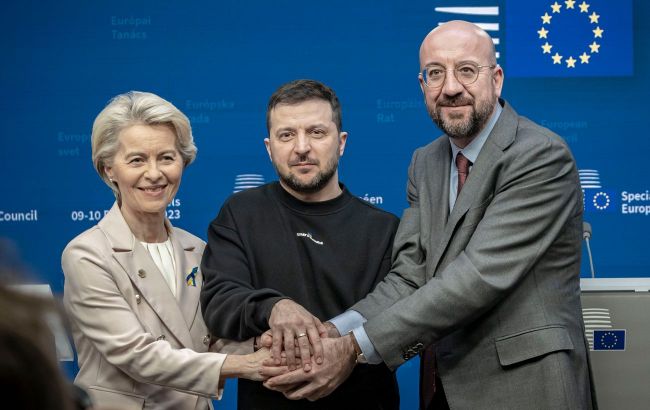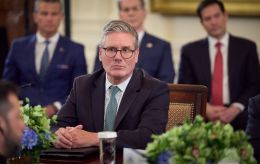EU approves €50 bn aid package to Ukraine
 Photo: The EU approved financial aid to Ukraine (Getty Images)
Photo: The EU approved financial aid to Ukraine (Getty Images)
On February 1, the leaders of the European Union approved the allocation of 50 billion euros to Ukraine within the framework of the Ukraine Facility program.
"We have a deal. All 27 leaders agreed on an additional €50 billion support package for Ukraine within the EU budget. This locks in steadfast, long-term, predictable funding for Ukraine," said Charles Michel about the outcome.
He also added that the EU was taking leadership and responsibility in support for Ukraine.
"We know what is at stake," concluded the President of the European Council.
How was the deal reached
The Guardian, citing the summit's final document, reports that EU leaders have agreed to discuss assistance to Ukraine annually, and if necessary, review it every two years. According to the media, leaders also agreed to two conditions set by Hungarian Prime Minister Viktor Orbán.
The first condition is that after two years, the European Commission will conduct a "review of the spending." There will be a separate vote on this matter. The second condition involves an "additional measure on the rule of law conditionality mechanism."
Regarding the second condition, the Guardian explains: In 2020, leaders agreed to create a new mechanism that would allow the bloc to suspend funding for a member state if it fails to comply with rule-of-law-related norms. Later, the mechanism was activated to suspend part of Hungary's funding from the EU. In this way, Orbán agreed to give his support in exchange for unlocking European funds for Hungary.
In addition, the spokesperson for the President of the European Council, Charles Michel, has announced other leverage points. According to him, the Prime Minister of Hungary gave the green light after a series of meetings last night and this morning with the Prime Ministers of Italy and France, as well as the Chancellor of Germany.
Reaction of Ukraine and the EU
Ukraine
Prime Minister
Denys Shmyhal thanked the President of the European Council, Charles Michel, and the leaders of EU member states for unwavering support.
"Every vote of yours is a significant contribution to our common victory," Shmyhal said.
He emphasized that the Ukraine Facility is a four-year program with a total budget of 50 billion euros, with a significant portion directed to the state budget to help finance the budget deficit.
"One of the program's components involves creating a special investment tool to cover risks in priority sectors. It will enable attracting additional funds for investments," he added.
President
Volodymyr Zelenskyy expressed gratitude to Charles Michel and the leaders of EU member states, stressing the importance of military assistance to Ukraine.
"It is very important that the decision was adopted by all 27 leaders. This once again proves strong EU unity. Continued EU financial support for Ukraine will strengthen long-term economic and financial stability, which is no less important than military assistance and sanctions pressure on Russia," wrote Zelenskyy.
EU
Latvian Prime Minister
Evika Siliņa called the approval of 50 billion euros in aid to Ukraine "excellent news for the security of Latvia and all of Europe."
President of the European Commission
Ursula von der Leyen stated that the European Council has fulfilled its priorities, including supporting Ukraine, combating illegal migration, and supporting European competitiveness.
Estonian Prime Minister
Kaja Kallas highlighted that today's agreement demonstrates the unity of the EU and the ability to achieve results together.
Belgian Prime Minister
Alexander De Croo stated that the agreement shows that the EU keeps its promise to Ukraine and reaffirms the unity of the 27 member countries.
50 billion euros for Ukraine and Hungary's veto
In mid-December 2023, EU leaders gathered at a summit during which they approved the start of negotiations on Ukraine's accession to the EU. Additionally, they considered allocating 50 billion euros to Kyiv over 4 years as part of the Ukraine Facility program. However, due to Hungary's veto, a positive decision on the funding could not be reached. Therefore, European leaders decided to postpone this issue until February 1, 2024.
Since allocating 50 billion euros to Ukraine requires consensus among all European Council members, Hungary proposed various conditions upon which it was ready to compromise. Hungarian Prime Minister Viktor Orban suggested separating financial aid to Ukraine from the EU budget and creating a separate mechanism, with annual approval for parts of the 50 billion euro package.
However, before the summit, the media learned how EU leaders might bypass Hungary's veto. Reuters, citing the latest summit outcomes, wrote that European leaders would propose annual debates on the Ukraine aid package. This might prevent Budapest from vetoing the funds.
Ukraine Facility program
In June, the European Commission proposed increasing the EU budget for the next four years by 66 billion euros, with 50 billion (under the Ukraine Facility) earmarked for financial support to Ukraine. This initiative was supported by the European Parliament.
The Ukraine Facility involves allocating up to 50 billion euros for the period 2024-2027. This program will support efforts toward macrofinancial stability, recovery, and modernization while simultaneously implementing key reforms on Ukraine's path to EU accession. It also involves transitioning to a green, digital, and inclusive economy gradually aligning with EU rules and standards.
Previously it was reported that the 50 billion euro aid package to Ukraine - Ukraine Facility - would consist of 17 billion euros in grants and 33 billion euros in loans. President of the European Commission, Ursula von der Leyen, stated that the plan aims to cover up to 45% of all of Ukraine's financing needs by 2027.
In any case, the EU assured that Ukraine would not be left without support. The EU Ambassador to Ukraine, Katarina Mathernová, stated that the EU always has a Plan B in case of unforeseen circumstances.
For more details on the EU summit and the 50 billion euros for Ukraine, read our material.

